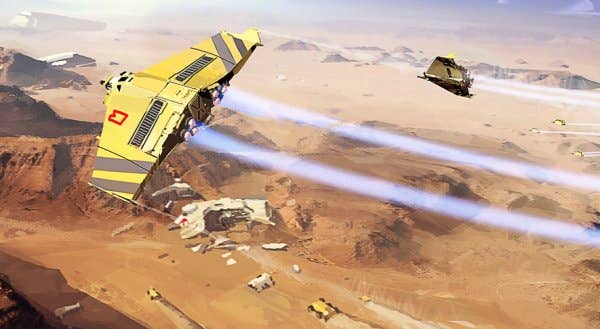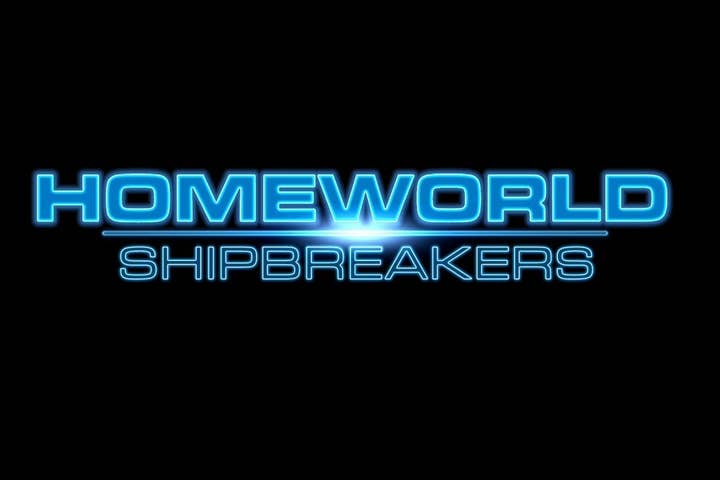Gearbox had "no clear path" for Homeworld IP
As Gearbox prepares two new next-gen projects, it invests in Blackbird Interactive's renamed Homeworld: Shipbreakers
With the rise in digital distribution and robust game creation tools like Unity, veteran developers are finding themselves returning to titles they've felt passionate about or worked on in the past. Those developers are planning new versions of those games, but without the brands they so love. This has led to the rise in 'spiritual successors': games that recall older titles, but without the original IP behind them. InXile's Torment: Tides of Numenera, Chris Robert's Star Citizen, Precursor's Shadow of the Eternals, and Keiji Inafune's recently-announced Mighty No. 9 have all banked on fan's love and a creator's previous work on an older title.
One of these spiritual successors was Hardware: Shipbreakers, an RTS title being developed at Blackbird Interactive. Blackbird is comprised of former Relic members who worked on the original Homeworld games and Shipbreakers was their chance to make a fresh start for the ideas that made Homeworld a fan-favorite.
This weekend, Blackbird Interactive and new Homeworld IP owner Gearbox Software announced a partnership, which sees Hardware: Shipbreakers become Homeworld: Shipbreakers. What once was a spiritual successor is now simply a successor. GamesIndustry International sat down and spoke with Gearbox Software president Randy Pitchford, Blackbird Interactive chief executive officer Rob Cunningham and Blackbird chief creative officer Aaron Kambeitz to dig deeper into how Gearbox put on its new publisher's hat and made this deal happen.
Pitchford told us that Gearbox chief creative officer Brian Martel was instrumental in the acquisition of the Homeworld IP. Martel had a deep love for the property and he convinced the rest of Gearbox executive team to bid on the assets when they went up in THQ's auction.
"THQ acquired Relic and they also ended up having the Homeworld property, but they weren't doing anything with it," Pitchford told us. "THQ went away and the assets were put up for auction. There was a lot of folks who were interested in Homeworld. What was clear is one of the pseudo-publishers or smaller publishers was just going to grab it, exploit the back catalog, and not be in a position to invest more. It's a cool property, what you can do in the space is cool, but it needs investment. We ended up winning the bid on that and it went for $1.35 million just to acquire the franchise."
Gearbox is already hard at work on getting the original Homeworld games out into the world. The games are coming in their classic untouched states, but there are also HD remakes coming to PC. Pitchford admitted that the studio didn't have a long-term plan for the series when it first acquired Homeworld and the executive team knew that Gearbox didn't have the ability to begin work on a sequel immediately.
"We didn't have a clear long-range plan when we started," said Pitchford. "The other folks that were bidding are great people, but their interests were different. Knowing how important it was to Brian, we had to know that it was not going to end up with folks who were treating it like a commodity. Even if we might not be optimal to make the next game, there's a whole body of very talented, very creative people. The right kind of team can be put together to do something wonderful. Even though we had no clear path, we had a lot of trust and confidence that the plan would appear."
"We're kind of busy. Borderlands became a massive thing. We've put a huge amount of our mindshare and effort into that. Also the next-generation of console is really exciting to us," he added. "So, Gearbox has begun developing two original properties. Two new original things for the next-generation. We haven't announced what those are yet, but the consequences of all that is that our internal mindshare has been very tapped. For us to internally start an effort to make a sequel to Homeworld would have wait."
Prior to Gearbox's acquisition, Cunningham and his team at Blackbird had already started work on Hardware: Shipbreakers. The game wasn't intended to be a Homeworld title, but Blackbird still approached rights holder THQ to see if the publisher was interested in the title. Cunningham said that talks went nowhere.
"We did approach THQ, but it was very, very early on," Cunningham explained. "It was before we had a prototype, it was before we had a game. We weren't talking about it being Homeworld obviously. I think not only were we a very quiet voice because we were so small, we were also so far away and speaking in a different language. I don't think the message really got through. Even if we did have a strong enough message, we weren't far enough along for them to take us seriously."
"We didn't have a clear long-range plan when we started. Even though we had no clear path, we had a lot of trust and confidence that the plan would appear"
Gearbox president Randy Pitchford.
"We had financed the game up until this point with private equity," added Cunningham. "And then we realized at a certain point that to really do this thing justice we need a lot more money. That's when we started looking for partners."
During the THQ auction, both Gearbox and Blackbird made offers on the Homeworld assets, but Gearbox came out on top. Blackbird congratulated Homeworld's new owners at the auction, a move Cunningham said "started the dialog."
"These guys had a project that they had already started talking about right around the time that we were going through the acquisition process," said Pitchford. "These guys were making a Homeworld game, but they didn't have Homeworld. I'm also not sure we're the best people in the world to do it. We haven't made RTS games before. We love the property and we want great things to happen, but it's not our property."
"These guys were going to fight that fight without Homeworld. We hadn't even finished the acquisition process when we first started talking," he said.
Gearbox is investing in Blackbird's title, not just loaning them the IP. The deal took six weeks from start to finish, according to Martel. Pitchford said it was a situation where "we needed them and they needed us." In fact, the paperwork for the deal was signed live onstage at PAX Dev, during Pitchford's keynote.
"I did the opening keynote on Wednesday morning and we actually signed the agreement. It happened to be finished the night before," said Pitchford.
"These guys phoned me up the night before and said 'can you please make it to Seattle?'" Cunningham laughed.
"We're not a publisher, which is maybe why we were able to go so fast," said Pitchford. "The mission that Rob presented to me is going to be wonderful, but these guys needed millions of dollars to achieve it. So it takes an investment. I'm really glad we're in a spot where we're able to do that."

Gearbox's success has allowed the developer to collect a sizable warchest, and the Blackbird partnership is part of paying that success forward.
"We've done really well with a lot of our games, so we're at a spot where out limiting factor isn't 'what can we do,' it's talent to execute on the opportunities," said Pitchford. "We have resources. We can take what we've earned and apply towards why we got into this industry to begin with. It feels really good to create cool shit. You always want to try to make the world more interesting by adding entertainment that can create joy and happiness for people."
"These guys have an amazing team, but the mission they have is larger than what their team is. There's a opportunity for people to join them and be a part of it. They've got a foundation of talent that knows how to make and ship games."
For Blackbird, it's a chance to finally continue what began in Homeworld 1 and 2. The studio has the chance to make a full-fledged successor - Homeworld: Shipbreakers will actually be a prequel to the previous Homeworld titles - without having to worry about changing designs to avoid calling back to Homeworld too closely. It's a chance a number of other developers can only hope to have.
"It felt like reuniting the brands was something that was in the future. I won't say that I designed [Hardware: Shipbreakers] as a Homeworld property, but I will say that I made sure that it wasn't designing it out. The number one thing that fits [Homeworld and Shipbreakers] together is the relationship we built with Gearbox: we share the same values in what we believe makes a great game," said Kambeitz. "We have an attachment to Homeworld because we see what it is and what it could be in the future. Our fear was that someone would pick it up and exploit it for the back catalog or do something strange like make an MMO. It was a delight to find out that [Gearbox was] interested in collaborating with us and helping us. It was meant to be."
"It's divine intervention. It's not a brilliant business strategy or anything, it's just blind, fantastic luck. It feels great. When something is meant to be and happens, you have this relaxed feeling," said Cunningham.
Gearbox is still figuring out how Homeworld: Shipbreakers will be released. The deal came together quickly because the studio isn't a publisher, but that lack of experience means it will have to learn to navigate in new territory.
"When people are passionate about it, they have talent and capability, and there are resources there: shit, there's going to be cool stuff. Just let it happen"
Gearbox president Randy Pitchford.
"We can do right by the brand, we can certainly promote it, but we're going to have to figure out the publishing path for this game," said Pitchford. "There's a lot of options. Digital is a nice, clean, easy option, but there's still a lot of value in retail. That'll be fun to navigate. There's a lot of interesting, stimulating problems in the business of [making games]."
Pitchford is glad the situation came together the way it did, putting talented developers together with available resources. Instead of the Homeworld IP continuing to sit stagnant, Gearbox and Blackbird have a chance to evolve the series.
"I wish this happened more. I don't know why it doesn't happen more, because to me, it's always obvious that the best stuff comes when capable talent is very passionate about what they're trying to do," said Pitchford. "You never get a win unless you start with people that really fucking care. As developers ourselves, we've always been very pro talent. I'm the president of Gearbox, but I did not come at this industry as a business guy. There's a lot of people in our industry on the business side where it's a means to an end. To me, games are the end. In the whole of human purpose, there's no greater thing than the experience of joy and happiness. I'm so grateful for people that become doctors and police officers, but I want to dedicate my life to creating happiness and joy."
"When people are passionate about it, they have talent and capability, and there are resources there: shit, there's going to be cool stuff. Just let it happen."

